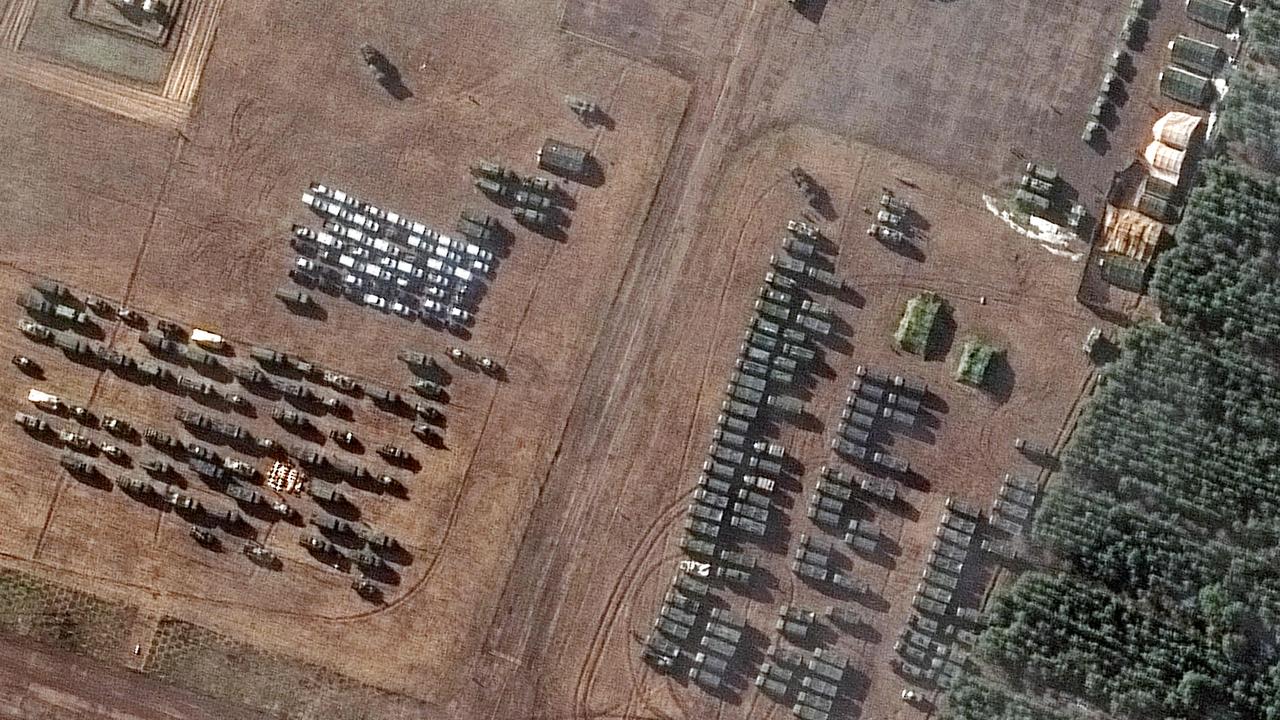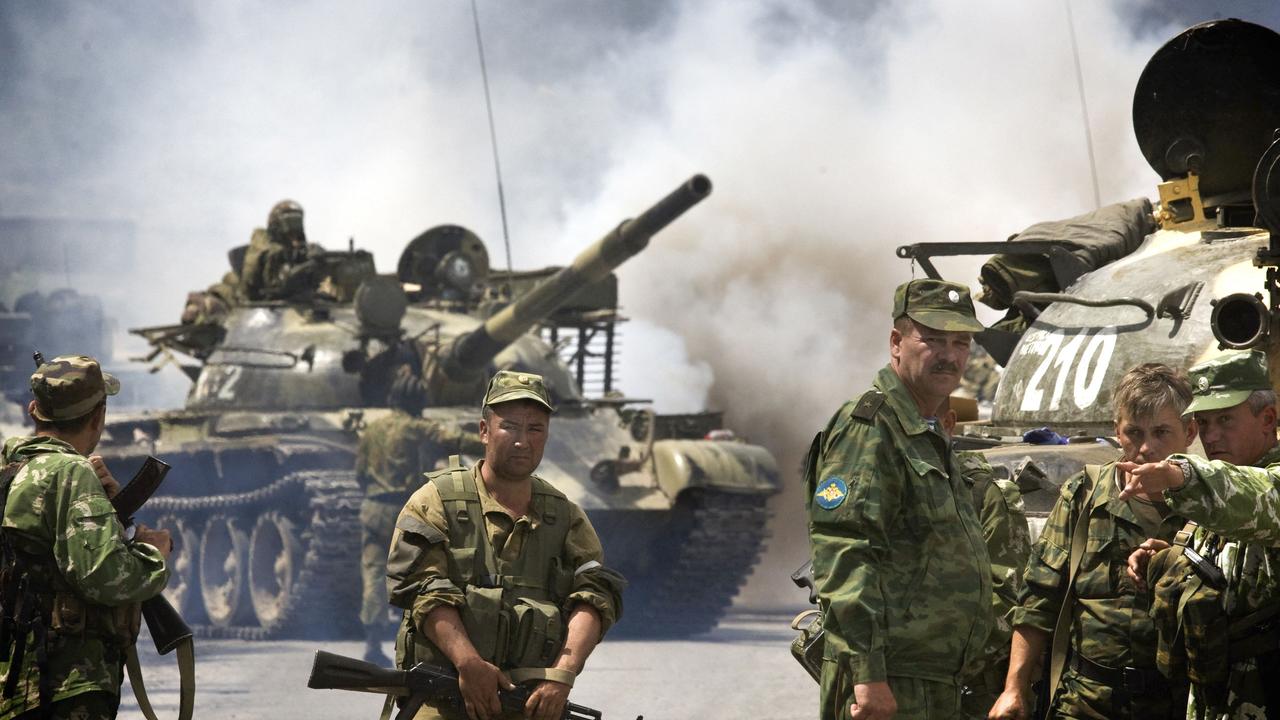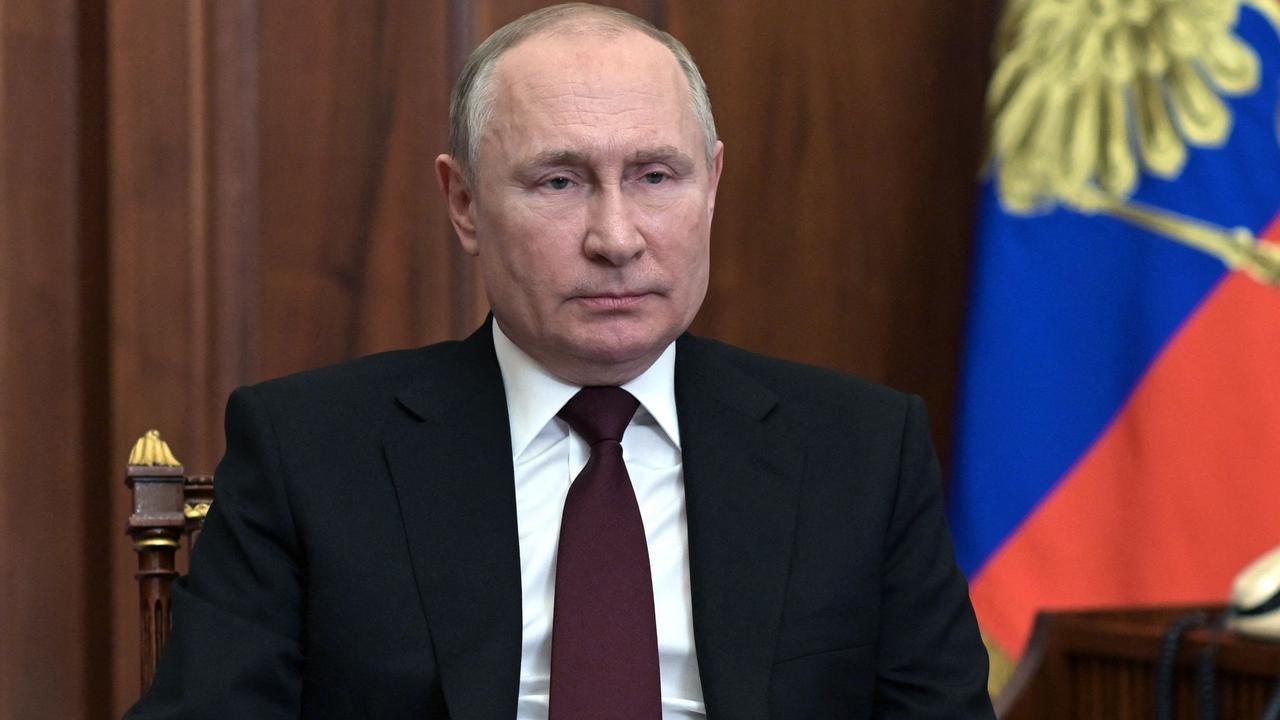Vladimir Putin appears to be using same playbook in Ukraine as Georgia invasion
Russian President Vladimir Putin’s Ukraine game plan appears to have been played out before, but with one “ominous” difference.
Russia’s actions in Ukraine seem unpredictable but Vladimir Putin appears to be following a playbook he’s used before — although there could be one crucial difference.
Russian tanks and 10,000 troops yesterday began entering the breakaway territories of Luhansk and Donetsk in eastern Ukraine – known collectively as the Donbas region, with the act being described by US President Joe Biden as “the beginning of a Russian invasion of the Ukraine”.
Mr Biden has been predicting for days that Russia would invade Ukraine.
Australian National University emeritus professor of strategic studies Paul Dibb told news.com.au that Russia’s moves were similar to what happened in Georgia when Moscow seized control of two regions during a 12-day war in 2008.
Several hundred lives were lost during the war that was sparked when Georgia tried to retake control of South Ossetia, where Russian-backed separatists had gained dominance.
Russia quickly sent in its troops and claimed victory, recognising the independence of South Ossetia and Abkhazia, and establishing permanent Russian military bases there.
The conflict came to head on August 8, 2008 when Russia launched a full-scale land, air and sea invasion of Georgia, which it described as a “peace enforcement” operation.
Prior to this the Russian ambassador to NATO, Dmitry Rogozin, had hinted that Georgia’s aspiration to become a NATO member would cause Russia to support the independence of the self-proclaimed republics.
Prof Dibb said Russia had sent in the same elite air force — the 76 Guards Airborne Assault Division — that are now gathered in large numbers in south Belarus, just 75km from Ukraine’s capital Kyiv. The unit was also involved in Russia’s annexation of Crimea.
“It’s a repeat performance,” Prof Dibb said.
“We’ve got two provinces, and what appears to be Russian ambition. In each case the Russians used military power and got away with it.”
Stream the latest news on the escalating tensions between Russia and Ukraine live & on demand on Flash. 25+ news channels in 1 place. New customers try 14 days free >

While Prof Dibb said Russia’s attack in Georgia had not been perfect, it had prevailed due to its “sheer mass and number”.
Ian Kelly, former US ambassador to Georgia under presidents Barack Obama and Donald Trump, and current Ambassador in Residence at Northwestern University in Illinois, also noted a similar sequence of events in both conflicts.
He said in both cases Moscow had given out thousands of Russian passports to people — around 600,000 have been distributed in Donbas — and claimed there were vulnerable people who needed to be protected.
Mr Kelly also noted that defacto authorities in the disputed regions had appealed for Russian help and for recognition.
In the current conflict, there were calls for Mr Putin to recognise the independence of the self-proclaimed “republics” of Donetsk and Lugansk, which he has done.
However, Mr Kelly said the 2008 conflict happened after Russia had secured the boundaries of the two regions, whereas in Ukraine the separatists only control about 40 per cent of the region they claim, raising the question of what Russia believes should be recognised.
“Are they going to have to use their military to take the rest of that of that region?” Mr Kelly said in an interview on ABC Radio National’s Breakfast on Wednesday.

Mr Kelly believes one difference with the 2008 conflict is there is more unity among other nations. The United States, the United Kingdom, Australia and other countries have all announced sanctions against Russia.
“This event, I think has the greatest solidarity across the transatlantic region,” Mr Kelly said.
“We have learned that you know, Putin is going to push until he’s pushed back.
“And while we’re not at the point where we would use military force — we wouldn’t bring NATO into Ukraine — I think that there’s a recognition that there have to be some costs imposed on this.”
Another key difference is ‘ominous sign’
Prof Dibb has also noted another important difference that could be an “ominous sign”.
During the conflict in Georgia, Prof Dibb said Mr Putin never suggested the Russians and the Georgians were “one people” as they are culturally different and many Georgians are Christians.
This is not the case for Ukraine and Mr Putin has been vocal about the country’s close ties with Russia.
“Ukraine is not just a neighbouring country for us,” Mr Putin said in a televised speech from the Kremlin.
“It is an inalienable part of our own history, culture and spiritual space. These are our comrades, those dearest to us – not only colleagues, friends and people who once served together, but also relatives, people bound by blood, by family ties.”
Donbas, which is dominated by mining and steel-producing industries, is predominantly Russian speaking, with many workers sent to the region after World War II during the Soviet era.
Prof Dibb believes Mr Putin’s insistence on the ties between the countries is significant.
“This is a much more ominous sign about his bigger ambition for the rest of Ukraine,” Prof Dibb said.

However, Prof Dibb believes Russia won’t attempt to take control of all of Ukraine.
“Ukraine is not a minor target … it’s the size of France, which is one of the biggest countries in Europe, (a war against a population of) 44 million people is not a side show,” he said.
Prof Dibb said even if Russia did invade capital Kyiv there would be rebellion among residents.
“His problem would be a violent insurrection, a long and bloody insurrection,” he said.
He believes Mr Putin might focus on the eastern half of Ukraine, possibly separating it from the rest of the country using the Dnieper River that runs through Kyiv as a border.
In contrast to the eastern half of the country, which is predominantly Russian speaking and dominated by heavy industries, the western half is Ukrainian speaking and mostly rural.
“I don’t think they are finished by any means,” he said.
“You don’t mass 175,000 troops and 500 aircraft for a picnic in the park.”






